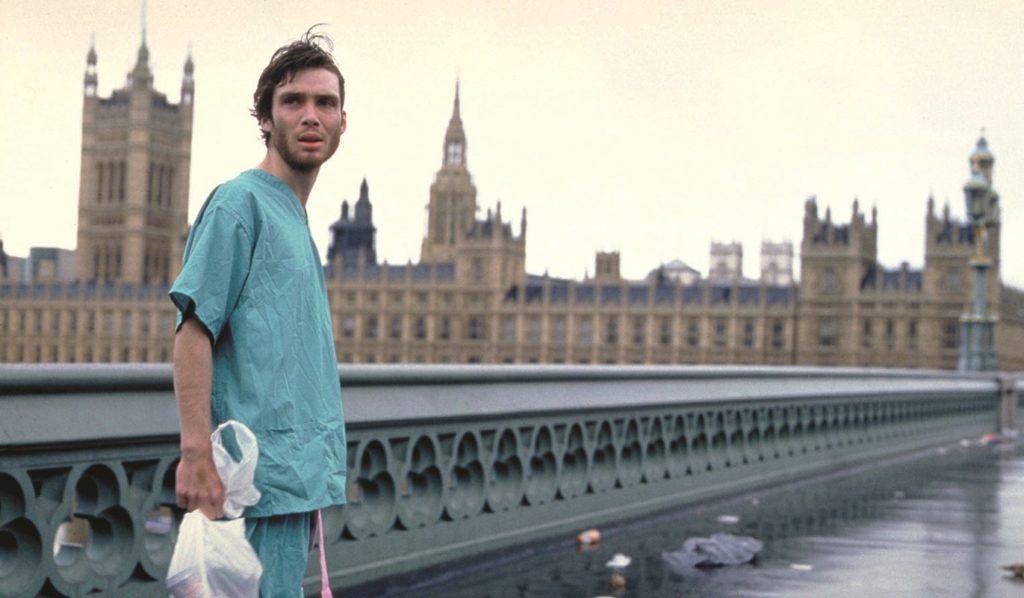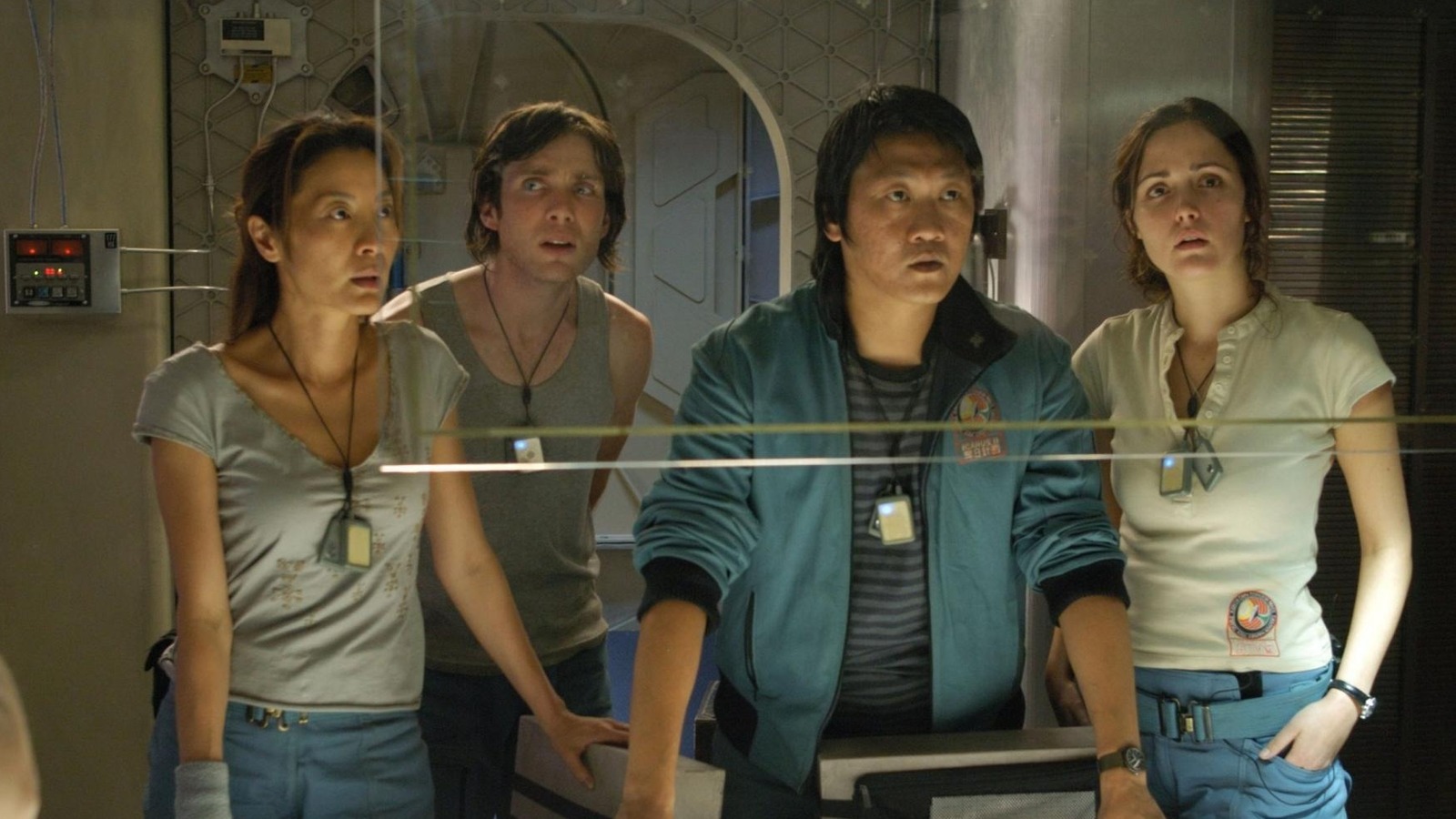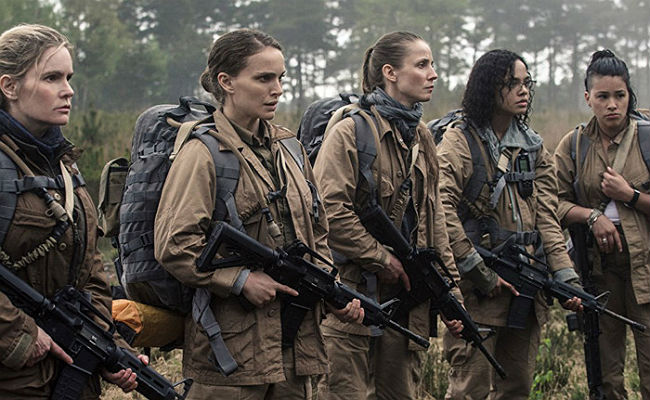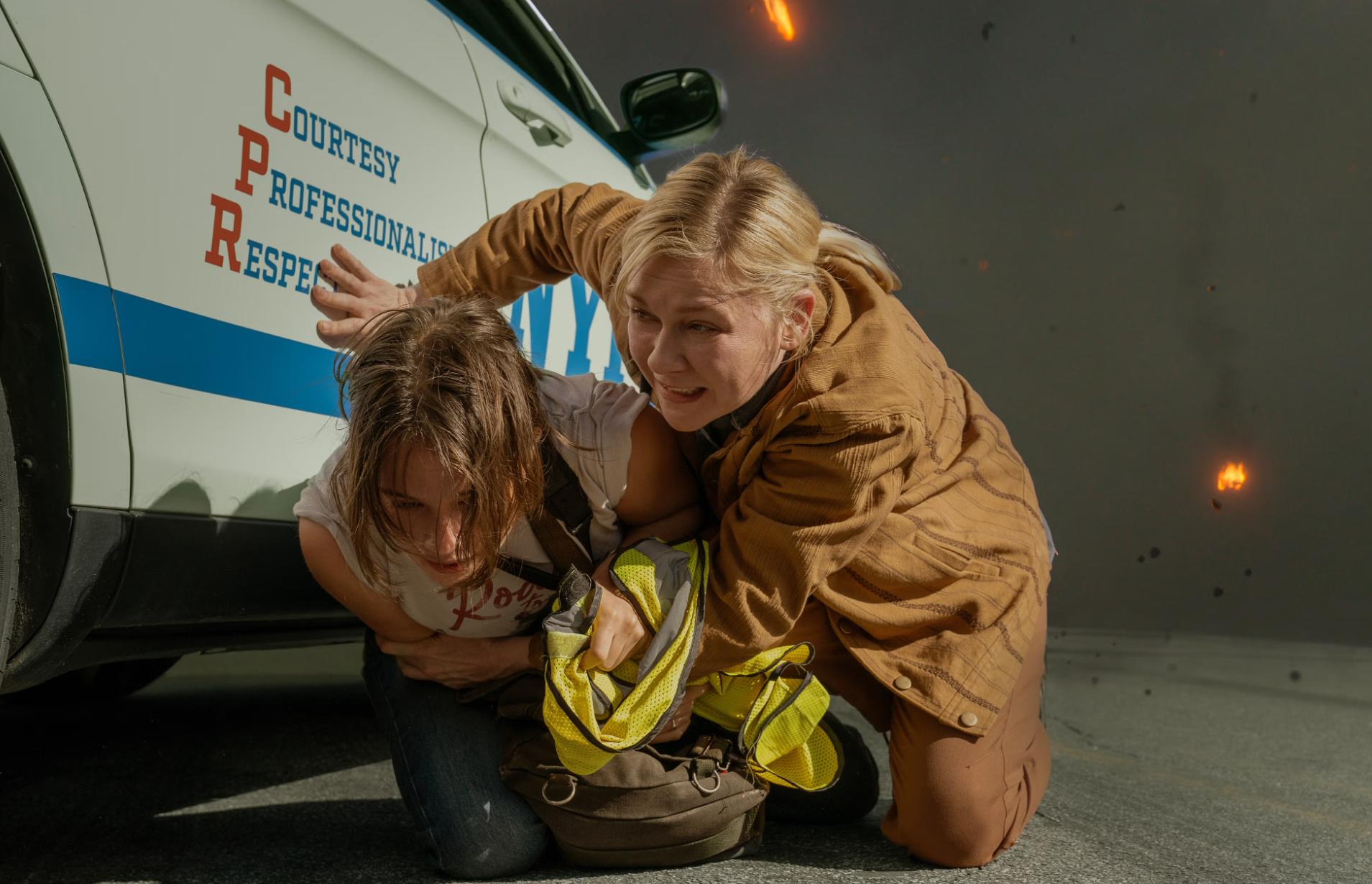
If you stare long enough at Alex Garland’s filmography, you might convince yourself you’re glimpsing the future. His art has a pesky habit of precognizing life. Soul-destroying fascinations with A.I., plagues thrusting first-world countries into societal collapse, resource-mining in space, civil war erupting in not-so-distant dystopias – some of Garland’s best work paints him as a thinking man’s fortune teller stationed behind a monitor instead of a crystal ball, divining beautifully wrought, frustratingly vague cinematic harbingers of our collective doom. That they’re often right is what makes them all the more interesting. And, sometimes, polarizing. In a way, that is by his own design.
“I think it’s important to be challenging sometimes,” Garland tells UPROXX after his latest effort, Warfare, outperformed expectations (with critics and at the box office).
The film is an exercise in reminiscence therapy, an attempt to build a memory from scratch from the movie’s co-director, Ray Mendoza, for his friend and platoon member, Elliot Miller, whose recollection of an early aughts mission-gone-wrong in Ramadi, Iraq, was blown to bits by an IED. Both Garland and Mendoza have been refreshingly frank in their approach to the heavily-trodden territory of Middle Eastern conflict – and our country’s role in it. The two met while working on Garland’s Civil War, the experience of filming the movie’s climactic final act inspiring both to launch an experiment in hyperrealism that, hopefully, would more accurately reflect the brutal reality Mendoza and his fellow soldiers were living during the U.S.’ War on Terror.
“Why not tell our story?” Mendoza says of his desire to replay a trauma that still haunts him on the big screen. “We have short memories. People are already forgetting, and it’s only been 20 years.” Even though the film is rooted in past events, it feels undeniably current, a reflection of our growing global turmoil and knee-jerk resolutions of violence that prove we haven’t learned much in the past two decades. In that way, it’s a quintessential Garland film, one that asks more questions than it provides answers.
With the release of Warfare, we took a look at some of Garland’s most thought-provoking films to see how the director has continued to challenge audiences across genres, forcing us to reckon with the future before it arrives.

28 Days Later
The streets of London are deserted. A man crosses the normally bustling Westminster bridge alone. Headlines warn of a new virus strain spreading rampantly amongst civilians. This is the beginning of Garland’s screenplay for a Danny Boyle-directed horror movie that would revive the zombie genre. It’s also a snapshot of the recent COVID-19 pandemic and the global lockdowns that reshaped our way of life, if only for a little while.
Of course, Hollywood has churned out plenty of outbreak movies that imagine the end-times by way of cell-destroying pathogens, but Garland’s version felt particularly disturbing. Not only did he correctly predict the resurgence of the undead – on-screen at least – but he also anticipated how quickly humanity could turn on itself when systemic routines were disrupted and we were left to self-govern our worst impulses. A rage virus turning healthy individuals into mindless cannibals is terrifying, sure, but even more frightening? The uninfected monsters who survive.

Sunshine
Another Danny Boyle – Alex Garland production with Cillian Murphy centered amongst the chaos, this sci-fi thriller sent Garland’s premonitive powers to space, imagining a future gone cold thanks to a dying sun. A plausible threat, one ironically at odds with our current climate reality, the movie still makes an interesting case about the roles science and faith play in the preservation of life. Does fundamentalism or free thought win the day? Do we determine our own fate or does hubris condemn us to only believing we do? If both religion and theory are unproven, which should govern us?
It’s weighty stuff to sit with in a zero-gravity pressurized tin can millions of miles from home, but even more fascinating is Garland’s take on the eco-consequences of the film. In talking with GQ last year, the director gave his read on the sticky moral dilemma of conservation, saying, “For me, Sunshine was a story about a world that’s dying and somebody saying, ‘By saving the world temporarily at this moment, all you’re doing is delaying the horror of extinction to your ancestors, and that’s not fair on them. We should take that horror ourselves, and not hand it on, as it were, to our great-great, great, great-grandchildren,’ because you are going to reach the same point.”

Ex Machina
Garland’s directorial debut for A24 sparked cinema’s renewed interest in artificial intelligence, eschewing robocops and replicants for a tightly-shot Turing test with terrifying implications. The film sees Domhnall Gleeson’s promising young programmer Caleb accept an invitation from an ego-centric tech mogul, Nathan (Oscar Isaac), to spend time at his villa observing his latest creation – an eerily-human bot named Ava (Alicia Vikander).
The experiment quickly derails as Isaac’s puppetmaster becomes more unhinged, Gleeson’s idealist naively infatuated, and Vikander’s intelligent humanoid even more adept at manipulating the fragility of human emotions. Plenty of sci-fi flicks have guessed that, given the chance, A.I. would turn on its human creators, but few have done it so masterfully as Garland’s. In Ava and to an extent, Nathan, we see human autonomy reduced to data points and search histories while online behaviors are wielded like weapons and the core elements that make us human are distilled into predictive algorithms.

Annihilation
An adaptation that strays far enough from its source material (the book by Jeff VanderMeer) to give us new, confounding metaphysical mysteries to solve, Annihilation is some of Garland’s most fascinating work. It follows a group of scientists embarking on an exploratory mission into a quarantined area known only as The Shimmer, where alien life has metastasized the landscape in unrecognizable and nightmarish ways.
It’s a film with kaleidoscopic themes that change depending on which light you view it from. Is it a metaphor for cancer, suicide, or the human instinct for self-destruction? Is it a smoke signal, warning us of nature’s ability to reclaim control? Or is it something even more timely? An argument that civilizations decompose just as easily as human bodies, that immersing ourselves in hostile environments can warp our minds and birth unrecognizable versions of ourselves?

Men
One of Garland’s more divisive films, Men sees Jessie Buckley play a woman named Harper who, still reeling from her husband’s death, removes herself to an idyllic country house – an Eden of sorts where she can grieve and contend with her guilt. Except her sabbatical of solitude is constantly interrupted by men – overly accommodating landlords, pervy vicars, and naked stalkers brutally birthing deformed doppelgangers. It’s a disturbing fever dream of a film, one that touches on everything from sexism in religion to toxic masculinity as it builds a nightmare in which women can’t seem to escape the abuse and malevolent influence of men, no matter how hard they try.

Devs
Garland’s first foray into television aired out his anxieties over our collective deification of the Silicon Valley sect. It follows Nick Offerman’s Forest, a tech titan building a quantum computer that allows him to play out the past and the future. Themes of grief, memory, and the limitations of man run rampant in the eight-episode series, but Garland made it clear that Devs was primarily born from his concern that society was attaching too much importance to the tech sector and the figureheads in charge. “Increasingly I was feeling that they’re not geniuses— they’re entrepreneurs who coincidentally are working in tech rather than milk production,” Garland told GQ. “We are ascribing qualities to them—or they’re assuming those qualities and believing they contain them themselves—on the basis of not much evidence.”

Civil War
Unfortunately, the premise of an American collapse via an incompetent commander-in-chief propped up by fanatical supporters and fascist-leaning “yes” men isn’t as forward-thinking as Garland might have intended. Perhaps that’s why Civil War, last year’s thrilling dystopian drama starring Kristen Dunst, Wagner Moura, and Cailee Spaeny as war journalists documenting the atrocities committed in the name of patriotism, seemed to trigger outrage amongst so many. Garland was intentional in predicting a violent future born of our inability to compromise and understand one another without offering any comforting prescription for such a fatal prognosis meaning audiences were left to sit with their uncertainty minus the kind of reassuring handholding a lesser film might have offered. The film also marks the first collaboration between Garland and Mendoza, who credits its final scene – a harrowing tactical takedown that plays as a one-take shot – as proof he could trust the director with telling a more personal war story: his own.

Warfare
Set in Ramadi, Iraq circa 2006, Warfare boasts a cast of next-wave stars fully committed to the tight, story-telling restraints Mendoza and Garland choose to operate under. Woven from individual threads of memory, dictated meticulously by Mendoza and his platoon members, the film drops audiences into the kind of every day, life-and-death monotony that can so easily twist and distort a soldier’s reality once they return home. Mendoza told us that he’d rather “die with it” than hand off something so personal to a director using the genre as a stepping stone for greater ambitions, which is why Garland felt like the perfect fit. In tossing out the Hollywood rulebook, trashing overdone tropes, and sapping any sentimentality from the action, the central mission of the film is unremarkable — and all the more devastating because of it. By refusing to tack on a message to the violence, Garland and Mendoza have created something timeless, a capsule to be buried and unearthed whenever we need a reminder of the futility of war and how patriotic idolatry hurts those stationed on the front lines.
